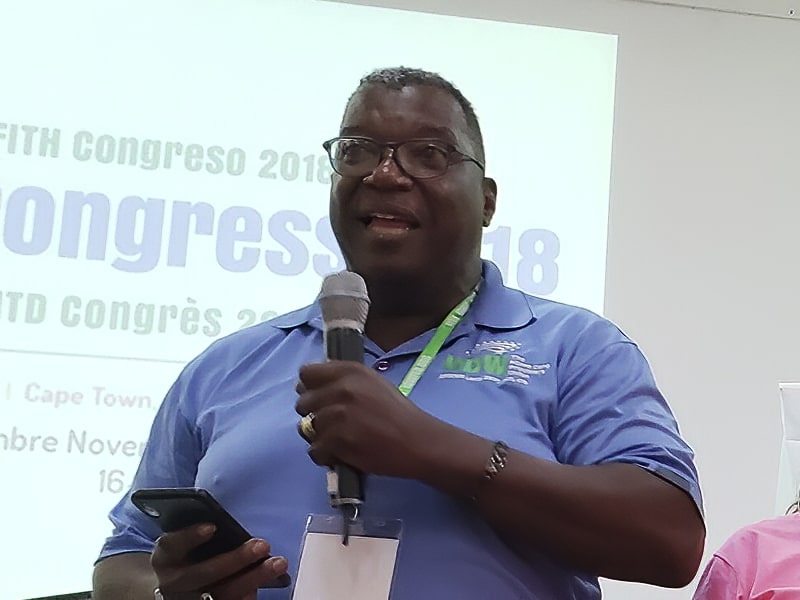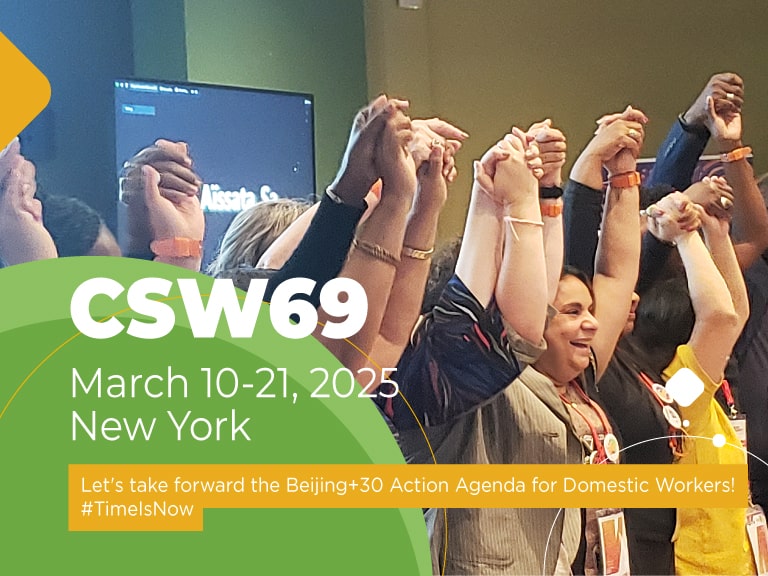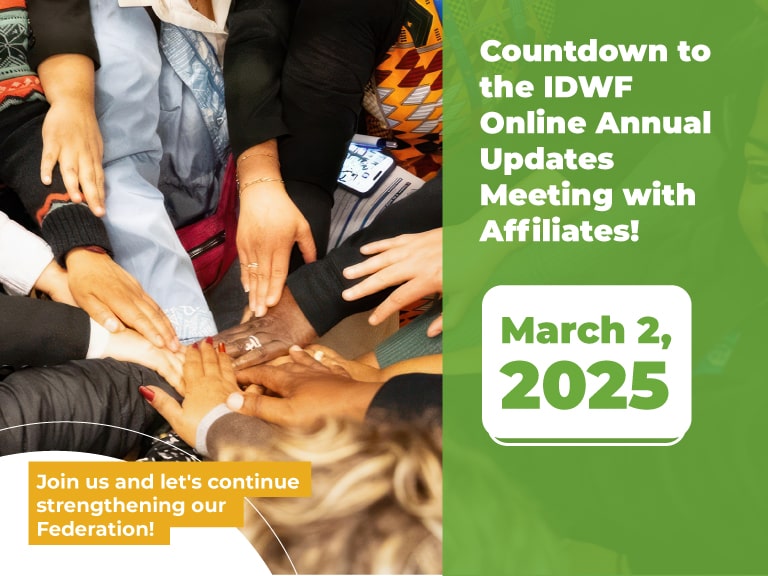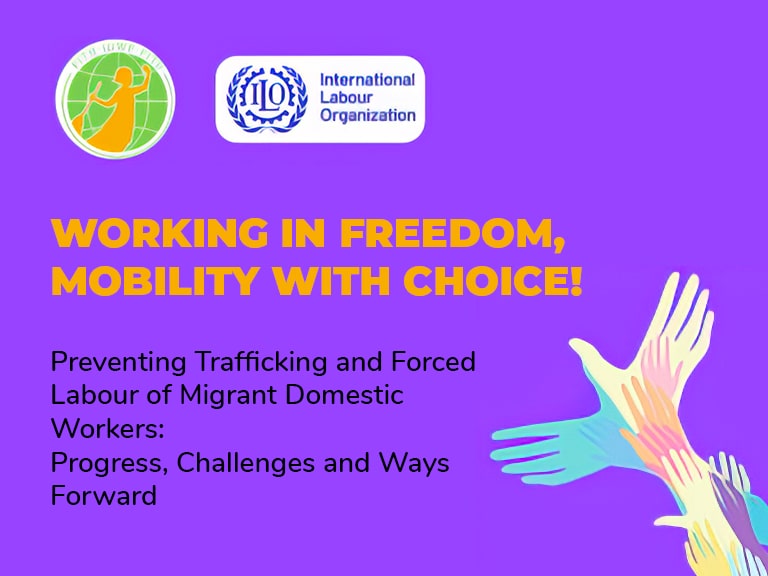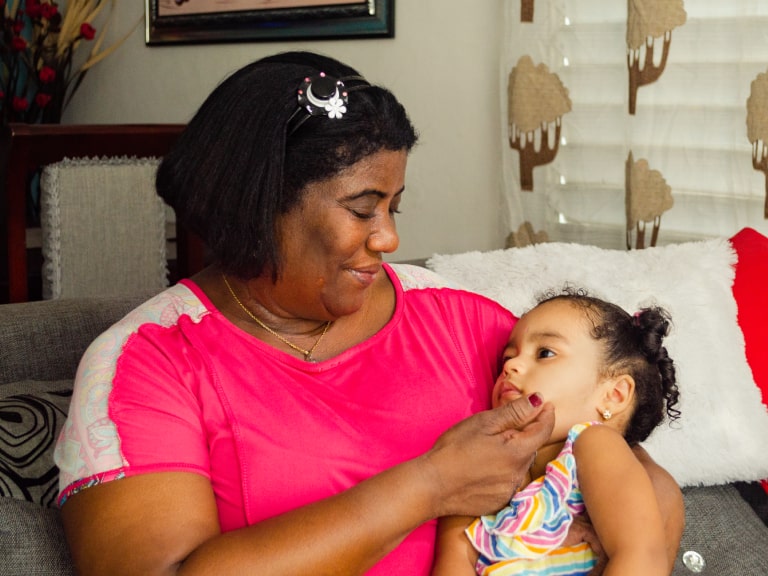- This event has passed.
The Battle is Not Over: We will Keep Uplifting Domestic Worker’s Voices
Interview with Doug Moore
USA –
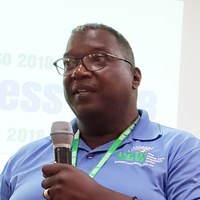
July 13th is a date we commemorate in the Domestic Workers’ Movement Calendar of the International Domestic Workers Federation, for it is the foundation date of the Black Lives Matter (BLM) movement.
On this occasion, we interview Doug Moore, Executive Director of United Domestic Workers of America, as a unionist in whose work labor and racial justice are intertwined.
Tell us about your journey of how did you come to the labor movement?
I came to the labor movement a long time ago, in 1980. I worked for a phone company called General Telephone at the time in California. And I did not get involved in the union until I got written up. I had a union representative, and once that issue got sorted out, I started going to union meetings. I started doing community organizing and got engaged working with workers to make their lives better, and eventually became executive vice president of our local union. And later, I left and went to work for the Service Employees International Union (SEIU) as a representative covering San Diego, Las Vegas, and Los Angeles. And later I went to an affiliate up in Oakland and worked there, all the time learning more about the work. And building power for workers because what I did best was internal organizing. So, people who are working but are not members of the union get to sign up. I worked in Oakland for a couple of years, and then I went back to LA with SEIU, and the national CEO called me, this was in 1998, I believe, and asked if I would come on staff with the national level. When they told me it was in the state of Ohio, I said no. Then I slept on it and I reconsidered and took the opportunity to work in Ohio where I had a responsibility over a million worker, to form political programs, community programs, and help the affiliates in labor councils. After a few years there I went to AFSCME. I came in as assistant managing director, they didn’t have the position but after two years of being there, they created that position based on the work I was doing with AFCSME. I had responsibility with ASME within 17 states. One of the things that I did was that there was an issue with a union, be it an audit, where things were not running correctly, so I went in and investigated with the locals. And the biggest one I had to come in to was UDW, of which I am currently the executive director. They were 3 million dollars in the red, and I was tasked to put a team together to clean it up. None of the executive board members were elected, they were all appointed by the president. So, we got rid of that entire board and created a new constitution under which we operate today. It took about three years to have them back up and elect a new executive board who were all homecare service providers. Their credit was good, and they wanted me to consider staying. So finally, I said, yes, I will stay. We had about 15,000 members state-wide, and since then we have grown to over 70,000 members.
Everything we do, we do from a social justice lens. The founders of UDW had good intentions. It is the 3rd union in the United States founded by people of color. The first being the Brotherhood of Sleeping Car Porters by Asa Philip Randolph, and then the United Farm Workers founded by Cesar Chavez, and then the United Domestic Workers founded by Ken Seaton-Msemaji and Fahari Jeffers, may her soul rest in peace. So, we have a history of social justice work at UDW because of the vision that domestic workers must be organized in the United States. And it was Ken and Fahari that took that on. We are proud of our history, we are proud of where we have come from, and we know that we have so much more to do.
Could you elaborate about what does it entail that UDW was founded by people of color: how does that set its work or vision apart from other unions with dissimilar history?
Racial justice is woven in everything that we do and that sets us apart. Not only racial justice, but environmental justice, mass incarceration and immigration reform, are at the heart of the work that we do at UDW. It is not just about representing the worker on the job but representing the worker in the communities they live at. Because when you look at environmental justice, for example, some of the communities that we represent live in environments that have the worst water, they are dumping sites, which is why environmental justice is so important and we play our role in that as well. We do not try to disconnect it, but to connect it where it intersects.
Along those lines of intersections, we often hear or speak of the domestic work sector as one that is burdened by the legacies of feudalism, colonialism, and slavery. Could you speak to that? What does that mean?
It does come from slavery in my view. Domestic workers in California, or in the United States, have not had overtime until a few years ago. The new deal was done decades ago, it included every worker, except for domestic workers and farm workers because those industries were predominantly women and Black people doing that work. They were excluded. Even today we are still fighting to have the representation and the rights that all workers have. UDW members do not have pension. UDW members have some sick time but not a lot: two days! The battle is not over, and the war is not over. And we will keep uplifting the voice of domestic workers and childcare providers to make sure they are treated equally under the law.
I live in in the Middle East and here there is a sponsorship system for the employment of migrant domestic workers, that allows the employer to file an “absconding” complaint when the worker resigns from a job, which the police follow up on to punish the worker. That policy screams racial capitalism. Are there similar examples of policy affected by slavery in the United States?
We talk about racism in America but what we do not talk a lot about in America is the caste system. I can be as successful as I want to be, but for those in power, I am a Black man. So, you are still considered a second-class citizen compared to a poorer white citizen. That is something that will have to change, and I do not know of a policy that could change that, I think it will have to be the will of the people. If not this generation, then the next generation will have to make these changes. And we see now with some of the things they are doing in the United States around voting rights: trying to make it harder for people to vote in some states, because they are moving the voting sites outside of communities were African American and Latino voters reside, which forms these huge lines which they created because there are not enough voting sites, and then they are passing some laws saying it is illegal for you to give somebody something to eat or give them water if they are standing in line. That just happened this year in Georgia. So, I think the ruling powers are starting to see the shifts, and they do not care if they are breaking the law to keep the power. We have to always say that no matter what you do to us, it is not going to stop us and we will keep pushing forward. And that is in several states that have introduced laws that discouraged voters from voting. I think Congress in the United States needs to act on this, so far they have not but 2022 needs to be a year where we take a leap, otherwise we are taking 10 steps backwards. Those in power today feel that they are losing it, and they will do whatever there is to do to stop it from happening. They are event trying to say that January 6 (2021 US Capital Attack) this year did not really happen, they are trying to say it was a tourist coming for a visit. They are downplaying it, and one thing about the United States when it comes to racism, they are not like the other countries. Germany recognizes what the Nazis did to the Jews, South Africa acknowledges the horrible things that happened under apartheid. In the United States, it is different, they say “that was 400 years ago, forget about it!” They do not want to acknowledge it or even say that slavery existed. They are trying to create this narrative that they came to the shores of America as peacemakers, when in fact they exterminated Native Americans. So until you are able to admit your wrongdoings, you’re never going to get it right.
So, we are still at the basic level of refusal of recognition or denial of slavery and ongoing racism. You have referred to it once as the “original sin”
I know I said slavery is the original sin, but the killing of Native Americans is way before what happened to slaves. So, they have a history of colonizing people and trying to convert them to what they want them to be.
And at the same installing the caste system telling white poorer people that they are better.
Exactly.
How would the US make amends?
They need to admit they did that. Our history books do not teach that. In Oklahoma, there was a community they called the Black Wall Street that put resources back into their community and they were doing a lot better than a lot of white communities. They burned the city down and killed over 200 people. In Oklahoma, in their history books, they never talked about it. Silence. So, until we can start acknowledging these atrocities that have happened to people of color, you cannot rebuild, you will just keep adding onto that lie.
Whenever a great injustice is done to people, others tend to distance themselves from it. They say, “we did not do it, our ancestors did it.” This also happens on a Global level, that slavery did not take the same dimensions as it did in the US. Could you comment on global trends of anti-Blackness in the domestic work sector?
People do say “that happened 400 years ago, and I did not do it.” They are right, they did not. But they continue to benefit from whiteness. Acknowledge that! As far as global migration goes, when I got involved with the IDWF, I started hearing the stories and that is why I wanted us to work with IDWF, so these stories are told to our workers. They do not know that in some parts of the world when a domestic worker gets employed, the first thing the employer does is take away their passport. When I heard that, I realized that they are being held captive! So how do you create the standards that will eliminate bad practices around migration where people are held captive? We must tell the story we cannot keep it to ourselves. Those of us who are not in these countries where such things are happening, we should be listening and figuring out how can we be helpful.
It all comes back to what you were saying about making the connections, and similar to white people saying that “I did not do it” but still benefiting from it, we can look at how do we benefit from standards that devalue migrant work or work of people of color, so we can stop normalizing discrimination and being complicit.
Right! There was an area in California back that was called Bruce’s Beach, and it was for Black people because they could not go anywhere else to spend time at the beach and not worry about being threatened. A Black couple had bought the property, but they had to leave the property and leave everything. So, what I am going to fast-forward: over the last couple of years, this story has been told and the property is demanded to be given back to the family. And if they get it back, whatever county properties are now on it must be subleased. There are so many stories like this in African American history where their land was just taken away from them. And I know other people who have it in their families where they will pay for the land, then minerals will be discovered in the land, so white people will come back and take it and not even give the money back. There are a lot of stories in the US that we are discovering. I just discovered mine a few years ago: my only living uncle said that story to me.
That is quite powerful, the personal meets the political. As a leader of the labor movement and many others, it is clear for you how racial and labor justice are intertwined. Could you tell us about a moment in the recent US when this intertwinement was made clear to the public?
The killing of George Floyd galvanized everybody, and I think that is where Black Lives Matter (BLM) come in. They were already a movement, but they have grown it more. More people are coming out and saying we are supporting what they are doing, because they were demonized when they first came in. They are now trying to come up with alternatives to policing, and what they are doing is admirable because they are diverting funds from police budgets, or I should say mental health, because that is where that money is coming from.
Mental health budgets for the police?
The police departments get money from mental health. And police are not social workers, they are not therapists. And as we start looking into these budgets and moving away some of that money towards communities. The work will be better off.
Speaking of mental health and health in general, now with COVID-19 we are hearing this narrative about how everyone is affected the same. That is not necessarily accurate. Could you comment on how has the sector experienced COVID-19, as I know UDW has been doing a lot of work supporting during the pandemic?
For UDW, it was a direct hit, because our members live in the homes, so they had nowhere else to go. So how we responded was to make sure that they had enough personal protective equipment, the gloves, the masks, and by getting education out there as much as possible. We did a tele-townhall with me and a doctor in various languages, so it was not just in English. We have a huge membership that speaks Spanish and a huge membership that speaks Vietnamese. We had pamphlets in both languages, and we went on a whole cross-country education trip around COVID-19 to make sure they had all the information, we came into a vaccination site as well. So, we were all in to get people vaccinated because we saw firsthand where the client get sick and the whole family gets sick and people passed. We twisted every hand and we got 200,000 masks and we were told what are you going to do with 200,000 masks? I said with 70,000 members, that’s not that many when you think about it. We did PPE distributions every 2 weeks. We will continue to provide protective equipment and education. In our tele-townhall meetings, we had 10,000 members at once. It costs to do that, but if you can reach 10,000 with a good message, it is worth putting these resources out there.
It is impressive how you managed to change operations so drastically and pull all this work together in almost an overnight. This also did not halt the other work you are doing against racism. I have read your statement on the killing of six women of Asian origin in the height of COVID-19 in the US. As domestic workers are mostly people of color and from the Global South, what is our duty towards one another in terms of fighting various forms of racism?
I will tell a story. I had a staff member who was telling me that her family is very anti-Black and very racist. She said “somebody needs to say something to them.” So, I looked at her and said “Aha.” So, she said “and that someone should be me.” I said “absolutely.” When it comes to any type of hate, I did not grow up that way. We were taught to respect everybody and that is the way my kids were raised. But in the US, recently over the last few years, you see this evolution of outwardly hatred for people who are not white, and in some cases, there have been Black people who had done it. And I ask “why does this happen? What has this person done to you? They are trying to make it just like we are.” The last few years, people have come out of the woodwork with their racism, and they are just wearing it on their shoulders. And I live in a progressive state, in California, and we still have a lot of folks like that here. Some of those hate crimes that happen against Asians, happened here in San Francisco where we have a big Chinese community there. So, for me, if you see something, do something, and do not turn your back the other way. Do not say “I don’t want to get involved” because then you become part of the problem.
Finally, on BLM’s foundation date, what should social movements learn? A social justice movement that “does not see color,” what is it not seeing?
First, I would like to ask them “how do you not see color?” Does everybody just look alike, and you do not see color? To me, you are building a movement in the wrong way. You should say we are all in this together, we do come from different lives and backgrounds but what do we have in common: We want to build power for domestic workers regardless of their race, what continent they are from. We are all one: See their color and see it for what it is! Magnify it, do not vilify it.
